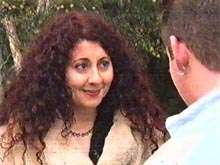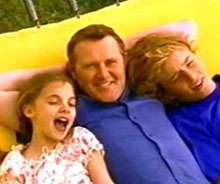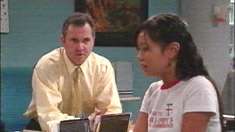|
.
Interviews
> Linda Stainton
Linda
Stainton’s name will be familiar to many Neighbours
viewers. She worked as one of four storyliners on the programme
in the late 1990s, and is now one of a series of writers who
regularly contribute scripts for the show. Linda kindly took
some time out to share with us her memories of working ‘in-house’
at Grundy’s and how she goes about writing current episodes
of Neighbours.
Can
you tell us how about your early career and how you became
involved in script writing?
Following
a BA in Visual Arts and English, I started as an actor, training
with the Sydney Corporeal Mime and then, from 1981 - 1982,
at Penrith's Q Theatre - a unique, hands-on training course
attached to the professional Q Theatre company. After completing
my formal education, it wasn't long before I returned to my
childhood habit of writing and performing
plays with whatever friends I could rope in. In 1986 I became
part of the ‘On Cue’ pub theatre in Windsor, NSW, a co-operative
of fellow Q graduates that devised and performed pub theatre
in repertory - until it folded after flooding for the second
time in its three-year existence. Not content, nor terribly
successful, with waiting for roles to turn up, I co-wrote,
produced and performed a number of original cabarets, pub
shows and community shows around Sydney, even venturing to
the Melbourne International Comedy Festival with The Bottom
Line in 1995. Some of these gigs were Theatre-in-Education
shows, involving extensive tours around the back blocks of
north-west NSW. Although my tax-returns showed the majority
of my income as coming from acting, I guess writing and devising
was always part and parcel of the whole shebang.
How
did you become a writer and story team member on Neighbours?
It
was Julie Mullins who suggested I send in a writing submission
to Neighbours. Julie had gone through the Q Theatre
Acting Course with me, and had by that time had finished her
two-year stint as Julie Martin in the show. I at first dismissed
the idea as being "not my kind of thing." But figuring
that it paid better than the telephone sales day job I was
currently languishing in, I gave it a go, writing submissions
to both Neighbours and Home & Away. I found writing ‘kitchen
sink drama’ was right up my ally. Home and Away gave me my
first gig, and I wrote for them freelance for three years
before becoming a script editor on Breakers.
In
1998, I was in Melbourne to accept an AWGIE (Australian Writers’
Guild Award) for Home & Away, which emboldened
me enough to approach Judith Colquhoun, then the Script Executive,
about writing for Neighbours. I felt at home as soon
as I walked into the script department, and was sure I would
be working there soon. Judith and the then script editor,
Louise Le Nay, gave me an hour of their precious time and
kindly promised to put me on the writers' waiting list, but
some months after that a spot came up in the storyline team
and I was offered that.
Can
you recall any memorable moments from your time 'in house'?
I've
never laughed so much as I did at those story meetings. At
that time they were led by Ben Michael as Story Editor, and
my story team-mates were the experienced ‘in-housers’ Piet
Collins, John Davies and Noel Maloney. I was the new kid on
the block and was horrified and delighted by the wicked things
these boys put the poor Neighbours characters through
- but strictly in the sanctuary of the story room! In fact,
all the writing staff took the show very seriously - they
wouldn't have held the job if they didn't - and by the end
of the day, miraculously, the real stories were deftly plotted.
The pressure of plotting five episodes a week, involving up
to eighteen major characters, exceeds anything I'd come across.
Perhaps writing five episodes of pure comedy would be harder?
Laughter was a natural way to let off steam and maintain sanity.
One
image I have is of Ben Michael riding his BMX bike round the
cramped office. Ben's own enthusiasm for the extreme sport of
BMX riding gave rise to Tad and Paul's craze, I am sure. Or
was it the other way around? Occasionally another stir-crazy
member of staff would pinch Ben's bike and do a few laps of
the office, but they weren't always as nifty at manoeuvring
the bike as Ben, to the annoyance of the staff trying who were
genuinely trying to work.
At
the time I was in-house, Friday arvo drinks at the office
were a strict tradition, and one that I enthusiastically upheld.
I do miss the contact with other writers as a freelancer now.
What
did your role as storyliner entail?
Meetings,
writing, meetings, writing, drinking... I mean more meetings....
Episodes are plotted about six months before they go to air
in Australia - that's how long it takes for the writing, script
editing, shooting and post-production process to be completed.
So, for each week in the office, we'd plot a week's worth
of episodes six months in advance.
This
is how it worked when I was there in 1999, and I'm guessing
it works pretty much the same now: Monday, Tuesday and Wednesday
were when the week's episodes were plotted. We'd start with
three of the four storyliners plus the script editor in the
story room and, if it hadn't already been done, begin by planning
the week's action. Then we'd start plotting in detail, episode-by-episode,
scene-by-scene. As the week went by, the storyliners would
peel off one by one and begin typing the plotted episodes
into Scene Breakdowns - a detailed summary, in prose, of what
will happen in every scene. This is the document, once overseen
and approved by the Script Executive, that the freelance writers
have at their elbow when writing their scripts. By Thursday
afternoon or Friday, providing the plotting had hit no major
snags, the Story Editor would work with one or two of the
storyliners in consultation with the script executive on planning,
refining and interweaving the major plot strands for the next
few weeks and devising and signposting the story points for
the upcoming months.
Meanwhile
each week, in rotation, one of the storyliners was kept free
to generate major story-lines. It was that person's job to
devise story arcs, large and small, for the main characters
and pitch them to the Script Executive, who would decide whether
any given idea was worth developing or not. Not as easy a
job as it sounds - on average, I'd say one in nine stories
I pitched ever saw the light of day. And as you can imagine,
the longer the show goes, the harder it becomes to come up
with stories that haven't already been done! Big story events,
like weddings or deaths or major impacting arcs are usually
the decision of the producer.
 |
Are
there any developments you oversaw, or were involved in, that
you are especially proud or fond of?
I
was quite proud of the story about Toadie's English girlfriend,
whose name now escapes me - I will have to check your website
- who was secretly using Toadie to get Australian residency
so she could be close to the real love of her life. The story
basically followed the arc I'd written except that somehow
in development, her character became much more arch and neurotic
than I'd intended. I actually had sympathy for her character,
driven as she was by an obsessive but doomed love-affair,
rather than by a malignant desire to hurt Toadie. But guest
characters, of necessity, do often end up functioning primarily
as foils to our heroes.
 |
What
has been your favourite episode and/or storyline to write
for?
I'm
a real girl in this respect. Stories to do with love, romance,
break-ups are what I get most involved in, and these are too
numerous, of course, to name! I also get quite fired up by
stories that touch on bigger issues - and there are many of
these, disguised, in Neighbours - such as Darcy's attempt
to sell the surgery to a big medical conglomerate. Darcy was
generally fun to write for, I suppose because his foibles
made for good stories, and because, despite his pronounced
bad points, he is driven by a need to love and be loved.
I
like writing for Max Hoyland and his kids because their situation
is very real, and the actors carry it off beautifully. There
is a big catharsis coming up for Susan and Karl; that too,
has been a good one to get one's teeth into.....
Can
you talk us through a typical commission to write a script
for Neighbours. How does one go about producing a finished
script?
These
days it's done by email, so, if you have a portable computer,
theoretically you can write and send them from anywhere in
the world! Writers are commissioned script by script, which
keeps us on our toes - there are no long-term contracts. Because
of the high volume of episodes, they are written in rotation,
so that I will write a Monday's episode for example, while
another writer writes that Tuesday's, another Wednesday's
and so on. Each writer has about twelve days from receiving
a detailed scene break-down, plotted by the storyline team,
to the deadline. I've known some freak writers to be able
to write one or even two serial scripts in a week but, to
maintain quality, the usual rotation for writers on Neighbours
is one script every three to six weeks. I don't know how many
writers there are on the Neighbours writing list, but
I figure it must be around twenty - but don't quote me on
that!
To
keep up with continuity, it's necessary for each writer to
read the scene breakdowns or synopses for every episode between
his or her own scripts. These are sent out on a weekly basis.
What
elements of writing an episode prove hardest? How does one
go about ensuring the text on paper will translate well on
screen?
I
personally find the first scene the hardest to crack for some
reason. After that, things start to flow. My writing is both
helped and hindered by my own acting experience. It helps
me understand the strengths and weaknesses of individual actors
on the show, and generally of what's ‘sayable’ and ‘doable’,
what's dramatic and what's not. There’s still no guarantee
of writing perfect dialogue, but it helps! On the other hand,
coming from a theatre background, I often have to pare back,
or resist the urge to over-write and over-explain. While British
TV's great strength is that it stems directly from a rich
theatre tradition, the writers understand that the mediums
are different, and have adapted accordingly - that's what
the challenge is for me.
 |
The
hardest thing to write is exposition. I admire the actor Alan
Fletcher, who plays Dr. Karl Kennedy, for his amazing ability
to deliver medical diagnoses in a natural, unforced, even
caring way. It makes your job easier when you know experienced
actors like he, and many others, in the show can convincingly
deliver whatever you throw at them.
Making
the teenagers sound real is also a challenge. In real life
the average Aussie male teenager tends to be pretty monosyllabic
when talking to adults. It's tempting, for authenticity, to
use the latest teen slang when they're talking among themselves
- but you know it will be passé after even six months.
That's where writers like John Davies shine, in my view.
Apart
from writing for Neighbours, what else are involved
in?
Following
my stint as a storyliner with Neighbours I moved to
Penrith, NSW, where I had trained at the Q Theatre, and in
2000 helped to establish The Acting
Factory Inc: an association for actors and other interested
people whose main objective is to produce high quality, affordable
theatre, locally and where-ever! Since its foundation I've
been the secretary as well as being involved in the shows.
Check out the website if you wish - better still, a plug would
be most appreciated!
What's
next for Linda Stainton?
Gulp!!!
Next year The Acting Factory plans, among other things, to
perform Shakepeare by the River - the Nepean, that is - which
we hope will become an annual event in Penrith.
I'm
also writing a short film for the Penrith Valley Economic
Development Corporation. Or I would be, if I wasn't happily
procrastinating by doing this interview!
And
lots more Neighbours scripts, I hope!
Is
that it, then?
Right.
Back to the script.
Maybe
I should have another browse at this Neighbours website
first......
Interview
by Rhys. Added on 1st November 2003
Back
|

